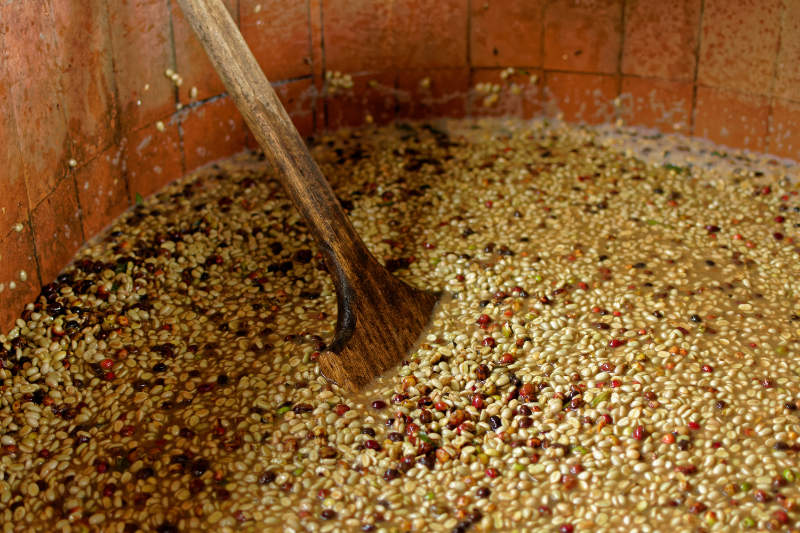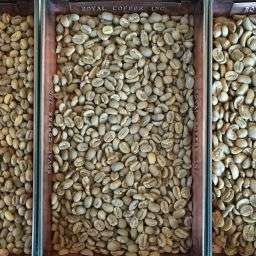
Introduction to Coffee Bean Fermentation
Coffee fermentation is a pivotal stage in coffee processing that significantly influences the final taste profile of the coffee. This biological process, where sugars are converted into acids, gases, or alcohol by microorganisms, plays a critical role in developing the coffee’s unique flavors and aromas.
Unlike the spontaneous fermentation that occurs in nature, coffee fermentation can be meticulously controlled to enhance specific sensory attributes, making it a cornerstone of flavor development in coffee production.
The Fermentation Process Explained
Coffee bean fermentation can occur naturally or under controlled conditions. Natural fermentation begins immediately after coffee cherries are harvested, relying on the indigenous yeast and bacteria present on the fruit.
Controlled fermentation, on the other hand, involves managing environmental conditions such as temperature, humidity, and microbial populations to achieve desired flavor profiles. This deliberate manipulation of the fermentation environment allows for the development of complex, nuanced flavors in the coffee.
Role of Microorganisms in Flavor and Aroma Development
Microorganisms, including yeast and bacteria, are instrumental in the fermentation process. They break down the sugars in the coffee cherry, producing acids and other compounds that contribute to the coffee’s final taste and aroma.
The diversity of microorganisms and their metabolic pathways lead to a wide range of flavor outcomes, from fruity and floral to nutty and spicy, depending on the fermentation technique and conditions.
Types of Fermented Coffee
- Cultured Coffee: This method involves adding specific strains of bacteria or yeast to the coffee cherries or beans to influence the fermentation process and, consequently, the coffee’s flavor profile.
- Barrel-Aged Coffee: Green coffee beans are aged in barrels previously used for aging spirits like whiskey or rum. This process infuses the beans with the barrel’s residual flavors, creating a unique tasting coffee.
- Kopi Luwak (Civet Coffee): Perhaps the most exotic, this coffee is made from beans that have been eaten and then excreted by the Asian palm civet. The digestive process ferments the beans, altering their flavor.
The Science Behind Fermentation
The fermentation process induces significant chemical changes in the coffee beans. These changes affect the coffee’s acidity, making it smoother and less astringent. Sugars are broken down into simpler forms, enhancing sweetness.
The body or mouthfeel of the coffee can become more pronounced, and tannins may contribute to a well-rounded sensory experience.
The exact impact on these attributes—acidity, sweetness, body, and tannins—varies widely based on the fermentation methods and conditions employed, illustrating the complexity and versatility of coffee bean fermentation in flavor development.
Roasting Fermented Coffee Beans
The roasting of fermented coffee beans introduces a unique set of challenges and opportunities compared to traditional roasting methods. Fermentation can alter the physical and chemical makeup of coffee beans, affecting their moisture content and sugar composition.
These changes require adjustments in the roasting process to fully capture the enhanced flavors developed during fermentation. Roasters may find that fermented beans roast more quickly or require lower temperatures to prevent burning the more delicate flavors.
This careful roasting helps preserve the unique profiles that fermentation brings to the coffee, such as increased sweetness or fruitiness.
How Fermentation Affects Roasting Profiles
Fermentation impacts roasting profiles by influencing the beans’ flavor, aroma, and color development during roasting. The breakdown of sugars and acids in fermented beans means that the Maillard reaction, a chemical reaction between amino acids and reducing sugars that gives browned foods their distinctive flavor, occurs differently.
Roasters must adapt their profiles to ensure that the nuanced flavors created during fermentation are not overshadowed by the roast itself. This often means a lighter roast to accentuate the bean’s inherent qualities rather than masking them.
Brewing Techniques for Fermented Coffee
Brewing fermented coffee effectively requires techniques that highlight its unique characteristics. Methods such as pour-over, French press, or cold brew can be particularly effective, as they allow for precise control over the brewing process and full extraction of the coffee’s complex flavors.
Adjustments in grind size, water temperature, and brewing time may be necessary to optimize the taste of fermented coffee, emphasizing its distinct taste profile compared to traditionally processed coffees.
Health Benefits Explained
Fermented coffee offers several health benefits, primarily related to digestibility and its impact on the gastrointestinal system. The fermentation process can reduce certain compounds that are difficult for some people to digest, making the coffee easier on the stomach.
This can be particularly beneficial for individuals with irritable bowel syndrome (IBS) or similar digestive sensitivities. Moreover, the microbial activity involved in fermentation can produce a cleaner and potentially safer product by reducing the presence of harmful bacteria.
Considerations and Risks
While there are benefits to consuming fermented coffee, there are also misconceptions and risks to consider. One common misconception is that fermented coffee is a significant source of probiotics.
However, the roasting process, which is necessary to make coffee drinkable, typically kills most, if not all, of the beneficial bacteria. Furthermore, improper preparation and storage of fermented coffee can lead to spoilage and the growth of harmful microbes.
Proper hygiene practices and careful monitoring during the fermentation and roasting processes are crucial to avoid these risks.
Fermented coffee presents an intriguing alternative to traditional coffee, offering unique flavors and potential health benefits. However, it requires careful handling from fermentation through to brewing to ensure that its qualities are preserved and enjoyed safely.
FAQs
Are all coffee beans fermented?
No, not all coffee beans undergo a fermentation process. Traditional coffee production involves drying and roasting beans without intentional fermentation. However, some specialty coffees leverage fermentation to develop unique flavors.
How does fermentation affect coffee flavor?
Fermentation can significantly alter coffee flavor, enhancing its complexity, sweetness, and acidity. It introduces a range of fruity, floral, and even earthy notes depending on the fermentation method and conditions.
Can fermented coffee beans be used in regular coffee machines?
Yes, fermented coffee beans can be used in regular coffee machines. They should be ground to the appropriate size for the machine, similar to any other coffee beans.
Is fermented coffee healthier than regular coffee?
Fermented coffee may offer specific health benefits, such as improved digestibility and reduced acidity, which can be gentler on the digestive system. However, the roasting process likely eliminates probiotics, making it not significantly healthier in terms of probiotic content than regular coffee.
Summary of Key Points
The exploration of coffee bean fermentation reveals its crucial role in flavor development, introducing an array of complex tastes and aromas. This process, whether occurring naturally or through controlled methods, significantly impacts the final coffee product.
Fermented coffee, through its unique production process, can offer health benefits like improved digestibility, although it’s important to note that the roasting process may diminish probiotic content.
Final Thoughts on Coffee Bean Fermentation
Fermentation represents an exciting frontier in coffee production, offering producers and consumers alike the opportunity to experiment with flavors and redefine traditional coffee profiles. As the industry continues to evolve, the application of fermentation techniques could become more widespread, potentially leading to new coffee experiences and standards.
The future of fermented coffee in the industry looks promising, with ongoing research and innovation likely to unlock even more potential benefits and flavors.








